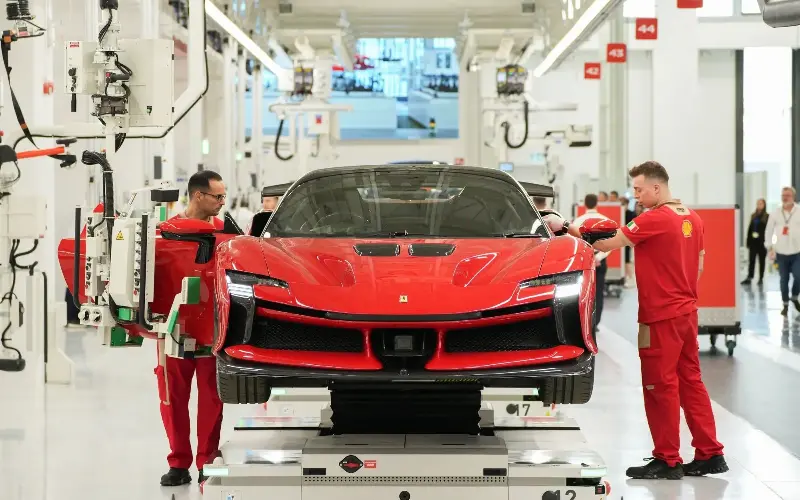
Ferrari has radically scaled back its electric vehicle (EV) plans amid tepid demand from drivers.
The Italian marque said only about 20pc of its lineup will now be electric by 2030, down from 40pc forecast three years ago.
Meanwhile, the number of traditional combustion engine models will be double the amount previously planned. The proportion of hybrids will remain the same.
Ferrari becomes the latest sports car manufacturer to delay its EV plans, following Porsche and Aston Martin.
The Maranello-based company said the move was prompted by the continuing popularity of petrol cars with its customers and reflected the “current environment and its expected evolution.”
News of the EV delay was accompanied by a conservative forecast for sales and earnings over the rest of the decade, prompting shares in the company to fall 14pc, the biggest drop since 2016.
Premium carmakers have struggled with the electric transition as their wealthy buyers baulk at switching to battery and plug-in models. EVs are also more costly to develop and build compared with the high-margin models that have defined brands like Ferrari for decades.
Ferrari announced its original EV production plan in 2022 when governments around the world were plotting a rapid shift to zero-carbon economies.
However, the political climate has since changed since then and demand for EVs has been weaker than expected among drivers, particularly for higher-end cars.
Lawrence Stroll, Aston’s executive chairman and biggest shareholder, last year said: “All our technologies are in place… Everything is in place. The only thing that isn’t in place is the consumer demand at this early stage.”
He said drivers wanted vehicles that “still have the sports car smell and feel and noise when you get onto the auto routes”. Aston Martin has delayed its first battery electric vehicle until the end of the decade.
In September, Porsche scrapped the launch of an electric version of its new SUV and said the model would instead be limited to combustion engine and hybrid versions.
In 2024, the German firm confirmed that petrol models would be available for longer, after indicating that it was slowing the pace of the transition and abandoning EV sales targets.
Audi, which originally planned to cease development of combustion-engine vehicles in 2026, will not move to a fully electric lineup until 2033 at the earliest.
The bosses of Stellantis, BMW and Mercedes met with Ursula von der Leyen in September, seeking a relaxation of EU emission targets set to tackle climate change. The bloc currently plans to ban the sale of new petrol and diesel cars by 2035.
Ferrari said that the Elettrica, its first full EV, will still commence deliveries next year as planned and offer the “exceptional driving thrills” of the traditional lineup.
It said the model will feature a motor on each wheel, delivering the equivalent of more than 1,000 horsepower and allowing it to reach 100kmph (62mph) in 2.5 seconds, with a top speed of 310 kph.
While the Elettrica will lack the roar of the Ferrari’s V12 engines, technicians plan to pick up the vibrations of the motor and amplify them into the cabin to create a similar background noise. It is expected to sell for at least €500,000 (£435,000).
